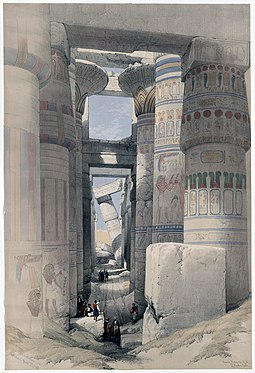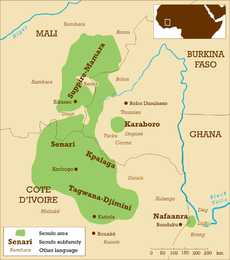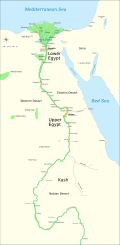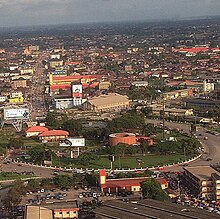Portal:Africa



Africa is the world's second-largest and second-most populous continent after Asia. At about 30.3 million km2 (11.7 million square miles) including adjacent islands, it covers 20% of Earth's land area and 6% of its total surface area. With nearly 1.4 billion people as of 2021, it accounts for about 18% of the world's human population. Africa's population is the youngest among all the continents; the median age in 2012 was 19.7, when the worldwide median age was 30.4. Based on 2024 projections, Africa's population will reach 3.8 billion people by 2099. Africa is the least wealthy inhabited continent per capita and second-least wealthy by total wealth, ahead of Oceania. Scholars have attributed this to different factors including geography, climate, corruption, colonialism, the Cold War, and neocolonialism. Despite this low concentration of wealth, recent economic expansion and a large and young population make Africa an important economic market in the broader global context. Africa has a large quantity of natural resources and food resources, including diamonds, sugar, salt, gold, iron, cobalt, uranium, copper, bauxite, silver, petroleum, natural gas, cocoa beans, and.
Africa straddles the equator and the prime meridian. It is the only continent to stretch from the northern temperate to the southern temperate zones. The majority of the continent and its countries are in the Northern Hemisphere, with a substantial portion and a number of countries in the Southern Hemisphere. Most of the continent lies in the tropics, except for a large part of Western Sahara, Algeria, Libya and Egypt, the northern tip of Mauritania, and the entire territories of Morocco, Ceuta, Melilla, and Tunisia, which in turn are located above the tropic of Cancer, in the northern temperate zone. In the other extreme of the continent, southern Namibia, southern Botswana, great parts of South Africa, the entire territories of Lesotho and Eswatini and the southern tips of Mozambique and Madagascar are located below the tropic of Capricorn, in the southern temperate zone.
Africa is highly biodiverse; it is the continent with the largest number of megafauna species, as it was least affected by the extinction of the Pleistocene megafauna. However, Africa also is heavily affected by a wide range of environmental issues, including desertification, deforestation, water scarcity, and pollution. These entrenched environmental concerns are expected to worsen as climate change impacts Africa. The UN Intergovernmental Panel on Climate Change has identified Africa as the continent most vulnerable to climate change.
The history of Africa is long, complex, and varied, and has often been under-appreciated by the global historical community. In African societies the oral word is revered, and they have generally recorded their history via oral tradition, which has led anthropologists to term them oral civilisations, contrasted with literate civilisations which pride the written word. During the colonial period, oral sources were deprecated by European historians, which gave them the impression Africa had no recorded history. African historiography became organized at the academic level in the mid-20th century, and saw a movement towards utilising oral sources in a multidisciplinary approach, culminating in the General History of Africa, edited by specialists from across the continent. (Full article...)
Selected article –
An Akrafena (Twi sword) is an Akan sword, originally meant for warfare but also forming part of Akan heraldry. The foremost example of an akrafena is the Mponponsuo (meaning "responsibility"), which belonged to Opoku Ware II. It has survived to the present day because it is still occasionally used in ceremonies, such as the Akwasidae Festival.
The expert use of akrafena is also a martial art, utilising the blade in conjunction with knives, improvised weapons, street-fighting, hand-to-hand combat, joint locks, grappling and weapon disarming techniques, as well as using the martial art of akrafena unarmed. The akrafena martial art is the national sport of the Ashanti Region. (Full article...)
Featured pictures –
Did you know (auto-generated) -

- ... that the Enterprise, a black newspaper in Omaha, supported a separate African American department at the 1898 Trans-Mississippi Exposition?
- ... that Roland Jefferson, the first African-American botanist to work at the U.S. National Arboretum, helped preserve the famous flowering cherry trees in Washington, D.C.?
- ... that Gil Scott-Heron's 1975 song "Johannesburg" was banned in South Africa during apartheid?
- ... that the pulse stops during the soliloquy of In C Mali?
- ... that during the First World War the East African Mounted Rifles sometimes painted stripes on their horses to camouflage them as zebras?
- ... that Freedom of Religion South Africa filed an unsuccessful lawsuit to keep child spanking legal?
Categories
Selected biography –
Jean-Baptiste Philippe Ouédraogo (French pronunciation: [ʒɑ̃ batist filip wedʁaɔɡo]; born 30 June 1942), also referred to by his initials JBO, is a Burkinabé physician and retired military officer who served as President of Upper Volta (now Burkina Faso) from 8 November 1982 to 4 August 1983. He has since mediated a few national political disputes and operates a clinic in Somgandé.
Ouédraogo received his early education in Upper Volta before joining the Upper Voltan Army and studying medicine abroad. After working in healthcare, he was appointed chief medical officer of the Ouagadougou military camp. He participated in the November 1982 coup d'état and shortly thereafter assumed the presidency. More ideologically moderate than most of his comrades, Ouédraogo did not command much popular support and governed the country amid an unstable political climate. A protracted dispute with Prime Minister Thomas Sankara resulted in his removal from power in a coup in August 1983 and imprisonment. He was released in 1985 and resumed medical work. He opened a clinic in Somgandé in 1992, which he still operates. In the 2010s, he acted as a mediator between opposing political factions. (Full article...)
Selected country –
 |
 |
|

| ||
Lesotho, officially the Kingdom of Lesotho, is a landlocked country entirely surrounded by the Republic of South Africa. Formerly Basutoland, it is a member of the Commonwealth of Nations. The name Lesotho roughly translates into "the land of the people who speak Sesotho".
Lesotho covers 30,355 square kilometres (11,720 sq mi). The most notable geographic fact about Lesotho, apart from its status as an enclave, is that it is the only independent state in the world that lies entirely above 1,000 meters (3,300 ft) in elevation. Its lowest point is 1,400 meters (4,593 ft), and over 80% of the country lies above 1,800 metres (5,900 ft).
The Lesotho Government is a constitutional monarchy. The Prime Minister is the head of government and has executive authority. The king serves a largely ceremonial function; he no longer possesses any executive authority and is proscribed from actively participating in political initiatives. (Read more...)
Selected city –
Benin City is the capital and largest city of Edo State, southern Nigeria. It is the fourth-largest city in Nigeria according to the 2006 census, after Lagos, Kano, and Ibadan. (Full article...)
In the news
- 12 February 2024 –
- Two boats collide on the Congo River near Kinshasa, Democratic Republic of the Congo; with the death toll remains unclear. (AP)
- 11 February 2024 – 2023 Africa Cup of Nations
- In association football, hosts Ivory Coast win their third Africa Cup of Nations by defeating Nigeria 2–1 in the final. Sébastien Haller scores the winning goal in the 81st minute. (The Guardian)
- 10 February 2024 – Somali civil war
- Four Emirati soldiers and a Bahraini military officer are killed, while ten other people are injured, when a soldier opens fire at a military base in Mogadishu, Somalia, before being killed in the ensuing shootout. Al-Shabaab claims responsibility. (AP)
- 10 February 2024 –
- A Eurocopter EC130 helicopter crashes near Nipton, California, United States, killing all the six people on board, including Nigerian banker Herbert Wigwe. (CBS News)
- 10 February 2024 – 2023–2024 Senegalese protests
- Violent protests occur in Senegal following an announcement by President Macky Sall that presidential elections have been delayed from February 25 to December 15. (Sky News)
- 9 February 2024 –
- At least 18 people are killed during a collision between a bus and a truck on a road in Kinshasa, Democratic Republic of the Congo. (AP)
Updated: 16:33, 14 February 2024
General images -
Africa topics
More did you know –

- ...that the 1459 Fra Mauro map (pictured) reports that "a junk from India" rounded the Cape of Good Hope in 1420, around 70 years before the navigations of Vasco da Gama?
- ...that the 1998 Sudan famine was caused by human rights abuses in the midst of the Second Sudanese Civil War?
- ...that a smokie is a West African delicacy made by blowtorching the carcass of a sheep or goat without removing its fleece?
- ...that Anne-Marie Nzié, a Cameroonian bikutsi singer, dedicated the song Liberté to President Paul Biya and his party, the Cameroon People's Democratic Movement?
Related portals
Major Religions in Africa
North Africa
West Africa
Central Africa
East Africa
Southern Africa
Associated Wikimedia
The following Wikimedia Foundation sister projects provide more on this subject:
-
Commons
Free media repository -
Wikibooks
Free textbooks and manuals -
Wikidata
Free knowledge base -
Wikinews
Free-content news -
Wikiquote
Collection of quotations -
Wikisource
Free-content library -
Wikispecies
Directory of species -
Wikiversity
Free learning tools -
Wikivoyage
Free travel guide -
Wiktionary
Dictionary and thesaurus

























































































